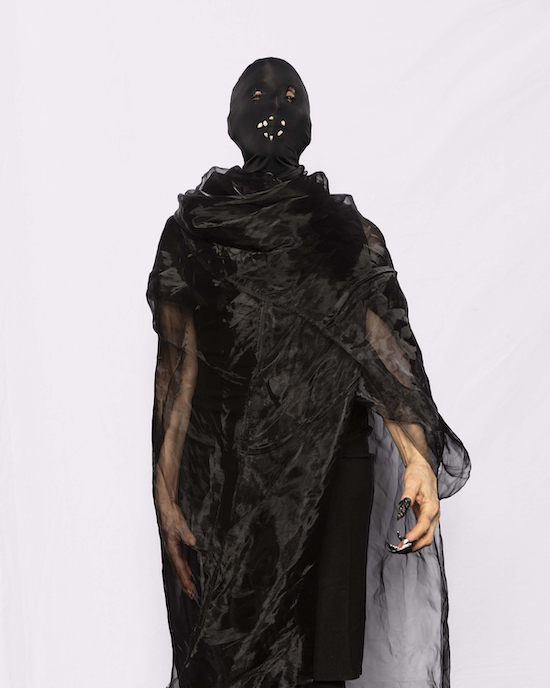Photo by Michael Tyrone Delaney
Trembling with cold and silent with stark fear
they reach out blindly with their blanching arms.
Now their brain writhes black from ear to ear,
whipping itself into a monstrous storm.’
Georg Heym – ‘Das Fieberspital/The Fever Hospital’, translated by Antony Hasler
There are certain artists who can call to you, who cut through the fog and murk of contemporary life, demand your complete and undivided attention, and display something that makes all other arts pale in comparison. That is who Diamanda Galás is for me. A formidable reputation rightly precedes her, but as our initial attempts to get the interview started are foiled by technology, she graciously cuts through my apologies with raucous laughter: “We should never be embarrassed by technology! It doesn’t mean shit man!”
Over the course of five decades, Galás has charted a remarkable course through culture with a single-mindedness that few artists possess. Artist, activist, musician, singer, interpreter, and inhabitor of the great songbook of the world, her work has always sided with the downtrodden. From her early performance of Vinko Globokar’s opera Un Jour Comme Un Autre (A Day Like Any Other) to her celebrated Masque Of The Red Death trilogy (The Divine Punishment, Saint Of The Pit and You Must Be Certain of the Devil) that confronted the AIDS epidemic, Galas has been the underground tribune of the oppressed. Her latest album Broken Gargoyles could not have arrived at a more apposite moment. The album is a fearsome statement comprised of two coruscating, epic-length pieces, ‘Mutilatus’ and ‘Abiectio’ that have their roots in deep research that Galas has been involved in for decades, on subjects including the pre-First World War German poet Georg Heym, anti-war activist Ernst Friedrich and the suffering of soldiers who had been horrifically maimed during that horrific “war to end all wars.”
“I started this work in 2012,” she says. “I responded to a poem that I’d read, The Fever Hospital by Georg Heym. It was in a book of German expressionist art, and poetry, drawings by Kandinsky for example. I came across this poem and it was devastating to me. This is something that I’ve done extensive reading about, the writer Ernst Friedrich showed it in War Against War, an infamous book which was banned, and taken off the shelves. The Nazis considered him to be a heretic, and guilty of treason. He was eventually put in prison because he expressed his views openly. In his book, he has photos taken from military libraries of the faces of soldiers that have been torn apart, and then the progressive surgeries. And what strikes me is when I see these picture is that the last picture isn’t that much better than the second picture. The author states this as well, that these are not gross improvements, it’s just a difference. So what I get from that is that these people are available by virtue of the fact that they can’t leave their beds, they can’t leave the hospital, they can’t find food, that they are subject to medical experimentation. And it’s terrifying when I think about it.
There are more contemporary resonances of her work, she explains, telling stories of the poor treatment of soldiers in recent conflicts that are shocking in the extreme. “I only recently became aware of its manifestation with the Walter Reed Army Medical Center,” she says. “Before it was in Maryland, it was in Washington DC, it was a surgical hospital, a military hospital. Everyone assumed that all the best was being done for the soldiers there from Afghanistan, but then there were a lot of complaints and they found out that in Building 18 they were being treated terribly. And this is where the parallel with Broken Gargoyles comes in; what they found out was that this building housed the most maimed soldiers, with no arms or legs, with facial mutilation, with extreme brain damage, people that were blind, and that opposed to the rhetoric that had gone out about their care, the reality was they were living in tiny rooms with black mould, rats, insects, with bad plumbing, no temperature control, and they were just vegetating in these rooms.
“When they first came back from the war they were promised all these things, but after weeks in the hospital per se, they were put somewhere else where they were supposed to wait, like some most of harbour, waiting for the boats to come in – waiting for their checks to come in, for their care (to start), but unfortunately, they were stuck there and people would not answer their calls, nurses didn’t know where they were. You had people with extreme PTSD taking care of suicide candidates, and amputees taking care of new amputees
“This is something that Broken Gargoyles addresses obviously, as concerns World War One, but it’s a timeless situation, she explains. “The Dalton Trumbo film Johnny Got His Gun, I remember reading the book and then seeing the film. It was horrifying. I saw it again recently and it was even more horrific than when I first saw it. It really stapled down the idea – not the idea, but the reality – that when a soldier signs up to war, the soldier is signing up to be the property of the military state. Which means that whatever happens to him, he’s already signed up for. It’s a terrible thing because a person has to prove that things have reached a cataclysmic degree of poor treatment in order to get any rights, any justice, any treatment. This is a bad thing.”
Galás’ willingness to confront this harrowing subject, to deal with some of the most destructive injuries that a human being can suffer and still be human is the core of what Broken Gargoyles is about, which she affirms by way of an explanation of working processes.

Photo by Austin Young
“I don’t understand how a person’s mind could function in that position. I’m trying to discover, ‘What’s the state of mind of a person who has been so mutilated, jaw and face, that this person has no tongue, no lower jaw, and no vocal cords? How does this person call for help? How does this person call to have his needs met?’ How?!’ So I had to think about this, the idea of a passageway below the vocal cords and being able to see down, into the body. Who would like to see down the body of someone with no lower jaw, no vocal cords, no larynx? Who would like to see that, what that looks like is the feeling. It’s the same with the projects I’ve done about AIDS. I did five albums dealing with the issue because it’s so complex. It’s nothing that someone can discuss in fifteen minutes.”
She is keen to mention the importance of translator Anthony Hasler, whose 2004 translation of Georg Heym’s poetry she was eager to use. “I realised that I’d better get his permission to use his translations. I contacted him and he was so happy to be part of this process. He is a very humble person and I found that astonishing because he is an artist and a researcher. He put flesh on the bones, he gave years of his life to this. He’s a really incredible translator. I was very lucky to have his permission. And that’s why you and I can sit and look at the poems.
Usually with her source material, she explains, “I have to translate for myself. If I’m going to treat them, I need to have a match, word for word. If you have the poem itself, the words are going to be in a different order in a translated version than they would be in a libretto, let’s say, for a singer. Often librettos just take the poetic translation and then the singer is completely confused.
“I do it so that I will understand each word as I say it, and as I treat it. For me, if I don’t understand what I’m saying, then I can’t possibly say it. I’m not going to get the right timbre in the voice, I’m not going to get the right cadence to the line, I’m not going to know what phrases should be repeated either in multiple voices or as a soloist. Altogether if one looks at the treatment of these poems, there’s a gigantic responsibility on the performer. I’ve discussed this with singers of 19th century opera, and they do that; with every libretto they retranslate everything. The job is much bigger than people know, they think ‘opera singer, sings by ear, blah blah blah.’ Bullshit! It’s a big job. Especially if you are singing in different languages.”

Photo by Austin Young
I ask Galás about the first incarnation of the work, an installation piece at the Kapellen Leprosarium (Leper Sanctuary) in Hannover, Germany, and if Covid affected the piece at all; her reply is priceless.
I started the work in 2012 and yet people have asked me if this is a response to Covid! Although yes, it was postponed in April 2020 because of the lockdown and then in the July. I thought it was hilarious that a lot of artists were so desperate to make sure that they didn’t lose visibility that they were doing these shows anywhere, everywhere from their toilet to the fucking bedroom. This is actually a chance to live in the present and actually check this thing out. Are they really so fucking worried about their audience, whether they’re going to be there when you come back? Jesus Christ!”
Broken Gargoyles will be available via her own label Intravenal Sound Operations, so as a final question I ask Diamanda about her ongoing reissue series, and what it means for her to have a legacy.
“I think it’s one of those things. You put your record out and people tell you that it’s been distributed and then you find out that it wasn’t distributed… your work comes out and there’s something good about that. It takes a bit of work to do that, but it’s worth it, if one considers a legacy of work important and I think a lot of artists do, most artists do. I don’t know whether it’s vanity or its some idea that the work is important, or both, who knows? But it’s interesting. Usually, I don’t listen to my records after I do them, I don’t listen to them ever again. Someday I’ll come into a place and someone’s playing my music and I’ll leave immediately because I don’t want to go through the editorial process again! I already did it once, fuck it, I’m not doing it again! I’m outta here, I’m out!”
<a href=“https://diamandagalas.bandcamp.com/album/broken-gargoyles
” target="out">Broken Gargoyles is out now via Intravenal Sound Operations



